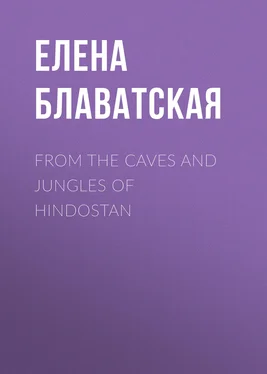Елена Блаватская - From the Caves and Jungles of Hindostan
Здесь есть возможность читать онлайн «Елена Блаватская - From the Caves and Jungles of Hindostan» — ознакомительный отрывок электронной книги совершенно бесплатно, а после прочтения отрывка купить полную версию. В некоторых случаях можно слушать аудио, скачать через торрент в формате fb2 и присутствует краткое содержание. Жанр: Путешествия и география, История, foreign_edu, foreign_antique, foreign_prose, на английском языке. Описание произведения, (предисловие) а так же отзывы посетителей доступны на портале библиотеки ЛибКат.
- Название:From the Caves and Jungles of Hindostan
- Автор:
- Жанр:
- Год:неизвестен
- ISBN:нет данных
- Рейтинг книги:5 / 5. Голосов: 1
-
Избранное:Добавить в избранное
- Отзывы:
-
Ваша оценка:
- 100
- 1
- 2
- 3
- 4
- 5
From the Caves and Jungles of Hindostan: краткое содержание, описание и аннотация
Предлагаем к чтению аннотацию, описание, краткое содержание или предисловие (зависит от того, что написал сам автор книги «From the Caves and Jungles of Hindostan»). Если вы не нашли необходимую информацию о книге — напишите в комментариях, мы постараемся отыскать её.
From the Caves and Jungles of Hindostan — читать онлайн ознакомительный отрывок
Ниже представлен текст книги, разбитый по страницам. Система сохранения места последней прочитанной страницы, позволяет с удобством читать онлайн бесплатно книгу «From the Caves and Jungles of Hindostan», без необходимости каждый раз заново искать на чём Вы остановились. Поставьте закладку, и сможете в любой момент перейти на страницу, на которой закончили чтение.
Интервал:
Закладка:
Dayanand jerked off the cobra twirling round his leg, and with a single vigorous movement, crushed the reptile's head. "Let him do so," he quietly assented. "Your god has been too slow. It is I who have decided the dispute, Now go," added he, addressing the crowd, "and tell everyone how easily perish the false gods."
Thanks to his excellent knowledge of Sanskrit the Pandit does a great service, not only to the masses, clearing their ignorance about the monotheism of the Vedas, but to science too, showing who, exactly, are the Brahmans, the only caste in India which, during centuries, had the right to study Sanskrit literature and comment on the Vedas, and which used this right solely for its own advantage.
Long before the time of such Orientalists as Burnouf, Colebrooke and Max Muller, there have been in India many reformers who tried to prove the pure monotheism of the Vedic doctrines. There have even been founders of new religions who denied the revelations of these scriptures; for instance, the Raja Ram Mohun Roy, and, after him, Babu Keshub Chunder Sen, both Calcutta Bengalees. But neither of them had much success. They did nothing but add new denominations to the numberless sects existing in India. Ram Mohun Roy died in England, having done next to nothing, and Keshub Chunder Sen, having founded the community of "Brahmo-Samaj," which professes a religion extracted from the depths of the Babu's own imagination, became a mystic of the most pronounced type, and now is only "a berry from the same field," as we say in Russia, as the Spiritualists, by whom he is considered to be a medium and a Calcutta Swedenborg. He spends his time in a dirty tank, singing praises to Chaitanya, Koran, Buddha, and his own person, proclaiming himself their prophet, and performs a mystical dance, dressed in woman's attire, which, on his part, is an attention to a "woman goddess" whom the Babu calls his "mother, father and eldest brother."
In short, all the attempts to re-establish the pure primitive monotheism of Aryan India have been a failure. They always got wrecked upon the double rock of Brahmanism and of prejudices centuries old. But lo! here appears unexpectedly the pandit Dayanand. None, even of the most beloved of his disciples, knows who he is and whence he comes. He openly confesses before the crowds that the name under which he is known is not his, but was given to him at the Yogi initiation.
The mystical school of Yogis was established by Patanjali, the founder of one of the six philosophical systems of ancient India. It is supposed that the Neo-platonists of the second and third Alexandrian Schools were the followers of Indian Yogis, more especially was their theurgy brought from India by Pythagoras, according to the tradition. There still exist in India hundreds of Yogis who follow the system of Patanjali, and assert that they are in communion with Brahma. Nevertheless, most of them are do-nothings, mendicants by profession, and great frauds, thanks to the insatiable longing of the natives for miracles. The real Yogis avoid appearing in public, and spend their lives in secluded retirement and studies, except when, as in Dayanand's case, they come forth in time of need to aid their country. However, it is perfectly certain that India never saw a more learned Sanskrit scholar, a deeper metaphysician, a more wonderful orator, and a more fearless denunciator of every evil, than Dayanand, since the time of Sankharacharya, the celebrated founder of the Vedanta philosophy, the most metaphysical of Indian systems, in fact, the crown of pantheistic teaching. Then, Dayanand's personal appearance is striking. He is immensely tall, his complexion is pale, rather European than Indian, his eyes are large and bright, and his greyish hair is long. The Yogis and Dikshatas (initiated) never cut either their hair or beard. His voice is clear and loud, well calculated to give expression to every shade of deep feeling, ranging from a sweet childish caressing whisper to thundering wrath against the evil doings and falsehoods of the priests. All this taken together produces an indescribable effect on the impressionable Hindu. Wherever Dayanand appears crowds prostrate themselves in the dust over his footprints; but, unlike Babu Keshub Chunder Sen, he does not teach a new religion, does not invent new dogmas. He only asks them to renew their half-forgotten Sanskrit studies, and, having compared the doctrines of their forefathers with what they have become in the hands of Brahmans, to return to the pure conceptions of Deity taught by the primitive Rishis—Agni, Vayu, Aditya, and Anghira—the patriarchs who first gave the Vedas to humanity. He does not even claim that the Vedas are a heavenly revelation, but simply teaches that "every word in these scriptures belongs to the highest inspiration possible to the earthly man, an inspiration that is repeated in the history of humanity, and, when necessary, may happen to any nation....."
During his five years of work Swami Dayanand made about two million proselytes, chiefly amongst the higher castes. Judging by appearances, they are all ready to sacrifice to him their lives and souls and even their earthly possessions, which are often more precious to them than their lives. But Dayanand is a real Yogi, he never touches money, and despises pecuniary affairs. He contents himself with a few handfuls of rice per day. One is inclined to think that this wonderful Hindu bears a charmed life, so careless is he of rousing the worst human passions, which are so dangerous in India. A marble statue could not be less moved by the raging wrath of the crowd. We saw him once at work. He sent away all his faithful followers and forbade them either to watch over him or to defend him, and stood alone before the infuriated crowd, facing calmly the monster ready to spring upon him and tear him to pieces.
Here a short explanation is necessary. A few years ago a society of well-informed, energetic people was formed in New York. A certain sharp-witted savant surnamed them "La Societe des Malcontents du Spiritisme." The founders of this club were people who, believing in the phenomena of spiritualism as much as in the possibility of every other phenomenon in Nature, still denied the theory of the "spirits." They considered that the modern psychology was a science still in the first stages of its development, in total ignorance of the nature of the psychic man, and denying, as do many other sciences, all that cannot be explained according to its own particular theories.
From the first days of its existence some of the most learned Americans joined the Society, which became known as the Theosophical Society. Its members differed on many points, much as do the members of any other Society, Geographical or Archeological, which fights for years over the sources of the Nile, or the Hieroglyphs of Egypt. But everyone is unanimously agreed that, as long as there is water in the Nile, its sources must exist somewhere. So much about the phenomena of spiritualism and mesmerism. These phenomena were still waiting their Champollion—but the Rosetta stone was to be searched for neither in Europe nor in America, but in the far-away countries where they still believe in magic, where wonders are performed daily by the native priesthood, and where the cold materialism of science has never yet reached—in one word, in the East.
The Council of the Society knew that the Lama-Buddhists, for instance, though not believing in God, and denying the personal immortality of the soul, are yet celebrated for their "phenomena," and that mesmerism was known and daily practised in China from time immemorial under the name of "gina." In India they fear and hate the very name of the spirits whom the Spiritualists venerate so deeply, yet many an ignorant fakir can perform "miracles" calculated to turn upside-down all the notions of a scientist and to be the despair of the most celebrated of European prestidigitateurs. Many members of the Society have visited India—many were born there and have themselves witnessed the "sorceries" of the Brahmans. The founders of the Club, well aware of the depth of modern ignorance in regard to the spiritual man, were most anxious that Cuvier's method of comparative anatomy should acquire rights of citizenship among metaphysicians, and, so, progress from regions physical to regions psychological on its own inductive and deductive foundation. "Otherwise," they thought, "psychology will be unable to move forward a single step, and may even obstruct every other branch of Natural History." Instances have not been wanting of physiology poaching on the preserves of purely metaphysical and abstract knowledge, all the time feigning to ignore the latter absolutely, and seeking to class psychology with the positive sciences, having first bound it to a Bed of Procrustes, where it refuses to yield its secret to its clumsy tormentors.
Читать дальшеИнтервал:
Закладка:
Похожие книги на «From the Caves and Jungles of Hindostan»
Представляем Вашему вниманию похожие книги на «From the Caves and Jungles of Hindostan» списком для выбора. Мы отобрали схожую по названию и смыслу литературу в надежде предоставить читателям больше вариантов отыскать новые, интересные, ещё непрочитанные произведения.
Обсуждение, отзывы о книге «From the Caves and Jungles of Hindostan» и просто собственные мнения читателей. Оставьте ваши комментарии, напишите, что Вы думаете о произведении, его смысле или главных героях. Укажите что конкретно понравилось, а что нет, и почему Вы так считаете.












